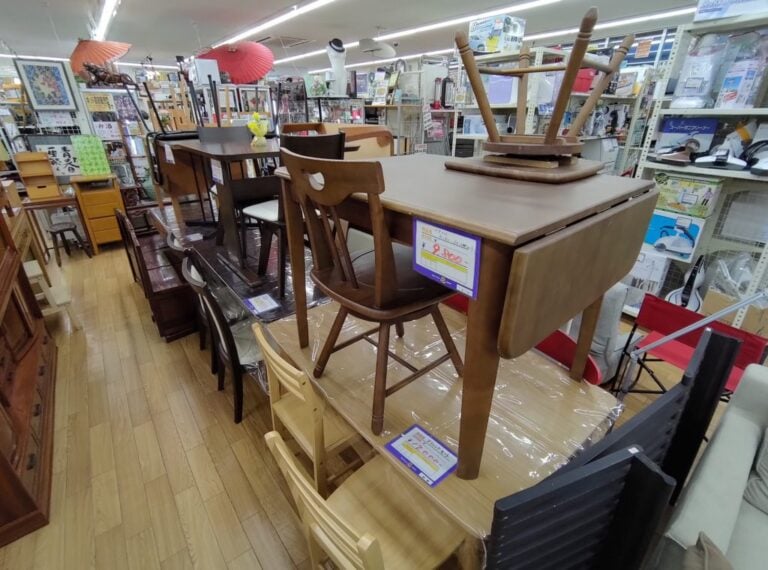
A while back I wrote an article on ways to save money on groceries. The advice there still stands, though expansion on what I discussed prior is merited in a future article. Yet, it was all advice on how to save money on groceries specifically. Perpetually accumulated costs like groceries, electricity, entertainment and the like have to be pruned as much as possible, of course, but in doing so many may neglect the effect that large, one-time costs can have on a budget.
Japan, I find, is more a country that nickel and dimes you to death, as opposed to gutting you with rare, large expense. There are exceptions to this rule however, such as when moving. Not only does one have to pay two months rent up front, (along with the requisite gift money) but there’s also the matter of filling your apartment with necessary furniture and appliances. Via recently having moved into an apartment complex with just a kei car, I’ve been put in the unenviable position of furnishing an apartment from scratch. Contained in this blog is some advice for if you’re put in a similar situation; how you can do it too and how you can save as much money as possible.
Thrifting
The most crucial piece of advice I can give to somebody moving within Japan is to avoid buying anything new if at all possible. I can’t stress this enough: Go to every thrift store in your area and give a thorough look-around. Check every piece of furniture you can find, including and especially the ones still in box hiding in forgotten corners. Where you live in Japan will determine what second-hand franchises are closest to you, but a simple search for “recycle store” or “recycle mart” (リサイクルショップ) even in English will yield powerful results.
Even if you’re the kind of person who has to have everything in their home made of the finest materials with nary a scratch or scuff on them, you still owe it to yourself to check thrift stores, because many of them traffic in exactly that: You can still get your bourg on for half the price you would have paid elsewhere. What you have to keep in mind is that the Japanese are (in general) averse to used items, so stores will often not even consider showcasing something unless it’s in like-new condition, and any noticeable damage will incur a heavy price cut, even if it’s merely cosmetic. As an anecdote of this cultural quirk, I’m from America and the thrift stores in large American cities look like the aftermath of a carpet bombing at Target. Yet, in Japan I’ve yet to purchase something from a thrift store and regret it.
As a side note, and as much as I hate to say it, I recommend against IKEA for anything other than interior design inspiration and sampling their superb food court. For small doo-dads they’re great and all, but I find their furniture flimsy considering the high asking price, and often you find used IKEA wares in recycle marts anyhow.
Facebook Groups
The next best avenue to explore would be any online groups you can find with fellow expats and immigrants selling or outright giving away items that would command a high price elsewhere. See, when people are moving out, many are pressed for time to get rid of all their old furniture and what-not, especially if they’re leaving the country. As we’ve no doubt mentioned, disposing of large items in Japan is a pain, and this urgency to avoid the red tape of legally throwing out a fridge, etc. is the reason for these great bargains.
Online sales pages are usually conducted in English, although alternatives in other languages no doubt exist. We managed to pick up a kotatsu for 2000 yen, a ceramic heater for 1500, and an LCD television for free. I also nabbed a washing machine for 2000, which was a fixer-upper for sure, but also so under what one would expect from even a thrift store price that it’s not even funny.
Of course, I must put as a disclaimer to protect your own safety while performing these transactions. While I’ve never had anything other than positive experiences with sales like this, one should of course accept the offer of meeting with a stranger with the utmost security. Don’t meet at night, meet in a public place and if anything feels fishy, don’t be afraid to refuse their offer and flat-out leave. If you can, avoid going alone.
Equipment
If you want to save the most money, you’re going to need to do some heavy lifting yourself. Deliveries often cost money, so either get strong or get a favor from somebody who is, practice proper lifting techniques (lift with the legs, back straight, etc.) and get equipped with something that can help with the process.
For starters, you’re going to need some form of transportation. For some unfathomable reason, you can’t shuffle a hand-truck carrying an armoire onto the JR Line, so at least a kei car is a must. A kei car will be insufficient for some items though. For example, my Daihatsu ES can carry something 150 cm long, maximum, which led me to turn down many good offers. If you’re looking to pick up larger items, see if any of your friends have a bigger car or consider a rental, if said rental store permits moving large objects in it. Many thrift stores offer free deliveries under certain parameters, and it’s good Japanese practice anyway.
Also important is that you have the tools to move whatever you want to buy. For something as heavy as a refrigerator, a dolly is essential, especially if you live on one of the upper floors of an apartment complex. I bought mine for a decent price at Costco, although if I could’ve found one at a recycle store, I definitely would’ve bought it. I’m a pretty thin guy, yet I was still able to lift a 50-liter capacity washing machine on my own without assistance, but of course you have to determine for yourself what you can and can’t do.
General Advice
When obtaining a refrigerator, if you must transport it on its side, make sure it’s upright for a while before powering it on. When tipped over, coolant may mix with the oil and ruin the whole machine, but a long stand upright will help return things to normal.
Be willing to fix things you find for a low price if they have small issues. I recovered a broken DVD player from the junk (ジャンク) section of a thrift store, and by taking it apart and removing one errant and non-functioning component, I now have a DVD player that I bought for 100 yen.
Start early. I can’t tell you enough how time-consuming of a process it is to move on your own, especially if your new place is over an hour drive away. Move out everything you possibly can as early as you possibly can. If possible, make sure the key exchange for your new apartment is at least a month before your move-out date from your current place.
Reach out to a support group: For us, our church jumped at the chance to provide us with great furniture that was unneeded for them but essential for us. Find some community with similar interests or values, join as soon as you can and don’t be afraid to give your time to them. You will be surprised how willing they are to give in return.











